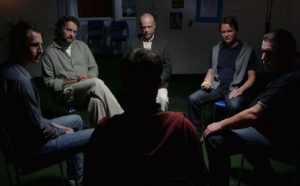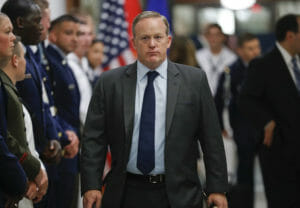Bush on Bin Laden’s Satellite Phone: Wrong Again
Bush rolled out an old canard about Bin Laden and the media rolled over. An inside look at the sticking power of a falsehood.During his Dec. 19 press conference, President Bush rolled out an old canard to buttress his claim that America needs tighter restrictions on media coverage of national security issues: Osama Bin Laden, according to Bush, slipped away in 1998 because a newspaper printed that U.S. forces were tracking him via his satellite phone–which Osama stopped using the next day.
The implication was clear: American intelligence might have been able to prevent the 9/11 attacks, but news leaks tipped off Bin Laden and made that impossible.
There was one problem with Bush’s statement: It’s not true.
Not that you would know that from reading The New York Times or the Los Angeles Times. The former ran a follow-up story supporting the president’s version of the facts, while the latter let it go unchecked. In fact, The Washington Post was the only major newspaper to set the story straight (in addition to Slate’s Jack Shafer). A Nexis search showed that the rest of the media did no follow-up at all.
At his press conference, Bush was asked about reports that the National Security Agency had conducted electronic surveillance of American citizens without the required court permission. Bush replied: “Let me give you an example about my concerns about letting the enemy know what may or may not be happening. In the late 1990s, our government was following Osama bin Laden because he was using a certain type of telephone. And the fact that we were following Osama bin Laden because he was using a certain type of telephone made it into the press as the result of a leak. And guess what happened? Saddam — Osama bin Laden changed his behavior. He began to change how he communicated.”
Glenn Kessler wrote three articles for the Washington Post directly after the press conference (on Dec. 20, Dec. 22 and Dec. 23). Kessler recounted the true story of Bin Laden and the case of the missing satellite phone: As it turned out, it had been widely reported as early as 1996 that Bin Laden communicated via a satellite phone; Bin Laden himself admitted as much to a CNN correspondent in 1997.
Thus, according to Kessler, Bush’s claim that it was a 1998 news story that caused Bin Laden to turn off his phone was, unequivocally, “wrong.”
As Kessler reported: In August 1998 President Bill Clinton ordered a cruise missile attack on Bin Laden’s training camps in Afghanistan in retaliation for the bombing of two U.S. embassies in Africa. Bin Laden survived, and he stopped using his satellite phone the next day.
The newspaper that Bush blamed for the tipoff was, surprisingly, the right-wing Washington Times. On Aug. 21, 1998, the day after the missile attacks, the Times ran a story that said Bin Laden “keeps in touch with the world via computers and satellite phones.”
But as early as 1996, Time magazine had reported that Bin Laden “uses satellite phones to contact fellow Islamic militants.” Time gave its source as Taliban officials, not U.S. intelligence — giving the lie to Bush’s assertion that government leaks were to blame for the outing of that piece of information.
Time repeated the information after the African embassy bombings, reporting in its Aug. 24, 1998, issue — on newsstands a week before the cover date — that Bin Laden “keeps in touch with the world via computers and satellite phones.” (Careful readers will note that the Washington Times story contained the exact same language as the earlier Time article.)
CNN broadcast a report by Peter Bergen the day of the cruise missile attacks in which Bergen said he had interviewed Bin Laden in Afghanistan in March 1997 and that “he communicates by satellite phone.” The same information appeared in newspapers in Japan, Germany, Pakistan and Philadelphia. (Jack Shafer’s article has a good rundown.)
So the facts are these: It was common knowledge years before the bombing that Bin Laden communicated via a satellite phone. The source of this information was not a leak from the U.S. government. Rather, it came first from the Taliban, and then from Bin Laden himself.
So why did Bin Laden stop using his sat phone after the attacks? It’s possible that he read The Washington Times the day after the attack on his Afghan base. But the most likely scenario is that the attack itself provided a compelling reason for him to “change his behavior,” in Bush’s words. Or, as Thomas S. Blanton, director of the National Security Archive at George Washington University, put it to the Washington Post, “Cruise missiles concentrate the mind a lot more than news clips do.”
The question, then, is how The New York Times, the Los Angeles Times and so much of the rest of the traditional media missed such an easy fact-check. (All due credit to Kessler and Shafer, but all it took was a quick Nexis search to cast doubt on the president’s assertion.)
Well, first of all, Bush wasn’t the only one who was pushing this tall tale. The 9/11 Commission told the same story in its report. As did two former Clinton administration officials, Daniel Benjamin and Steven Simon, in their 2002 book “The Age of Sacred Terror.” In it, they claimed the Washington Times article cost the United States its “best chance to find [Bin Laden].” Benjamin, a staff member on Clinton’s National Security Council, also repeated that myth in a story for Slate in the wake of Bush’s recent press conference.
Republicans other than Bush also have sought to make hay of the Washington Times myth. Rep. Peter Hoekstra, chairman of the House Intelligence Committee, gave a speech in July titled “Secrets and Leaks: the Costs and Consequences for National Security.” “Were it not for the leak,” he said, “there is a chance we could have brought Osama bin Laden to justice by now.”
For whatever reason, The New York Times did not do the simple Nexis search that would have turned up the Time article, the CNN report or any other number of pieces in the international news media.
The New York Times did do some checking on Bush’s claims about Bin Laden’s sat phone–and, to its shame, published a story headlined “Bush’s Account of a Leak’s Impact Has Support.” The piece, by David E. Rosenbaum, cited the 9/11 Commission report and the book by Simon and Benjamin. And even after the Kessler and Shafer stories appeared in their respective publications, the Times did not revisit the issue.
In fact, according to a search through media databases, the only newspaper that reported on the Washington Post’s findings was the one perhaps least likely to do so: the New York Post (whose politics are roughly akin to those of The Washington Times). Under a headline that read, “Bush’s ‘Bogus’ ’98 Leak Claim,” the Post wrote, “President Bush’s claim this week that the US government leaked information about Osama bin Laden’s use of a satellite phone appears not to have been true, it was reported.” The story was only 228 words long and was buried on page 16 of the “Sports Extra” section.
What’s important to remember here is that this is not just another quasi-adorable instance of Bush mistaking the difference between, say, Medicare and Medicaid. This particular erroneous report is being used by the White House and its allies as a major example of why we need tougher restrictions on media reporting on national security issues. According to Kessler, James B. Bruce, vice chairman of the CIA’s Foreign Denial and Deception Committee (no kidding), said in 2002, “We’ve got to do whatever it takes — if it takes sending SWAT teams into journalists’ homes — to stop these leaks.” Paul Wolfowitz, Bush’s former deputy defense secretary, cited the Osama sat phone story as one example of how “our intelligence sources and methods have also been devaluated by a pattern of leaks.”
Blanton of the National Security Archive said, “The whole sat phone story is the creation of a handful of intel pros who want an official secrets act in this country.”
If the American news media are going to prevent that, they’re going to have to do a better job than they did with this story: First they need to check claims made by the president, rather than reporting them as uncontested facts; and then they need to follow the example of Glenn Kessler at The Washington Post — and avoid at all costs the route taken by The New York Times.
Your support matters…Independent journalism is under threat and overshadowed by heavily funded mainstream media.
You can help level the playing field. Become a member.
Your tax-deductible contribution keeps us digging beneath the headlines to give you thought-provoking, investigative reporting and analysis that unearths what's really happening- without compromise.
Give today to support our courageous, independent journalists.






You need to be a supporter to comment.
There are currently no responses to this article.
Be the first to respond.